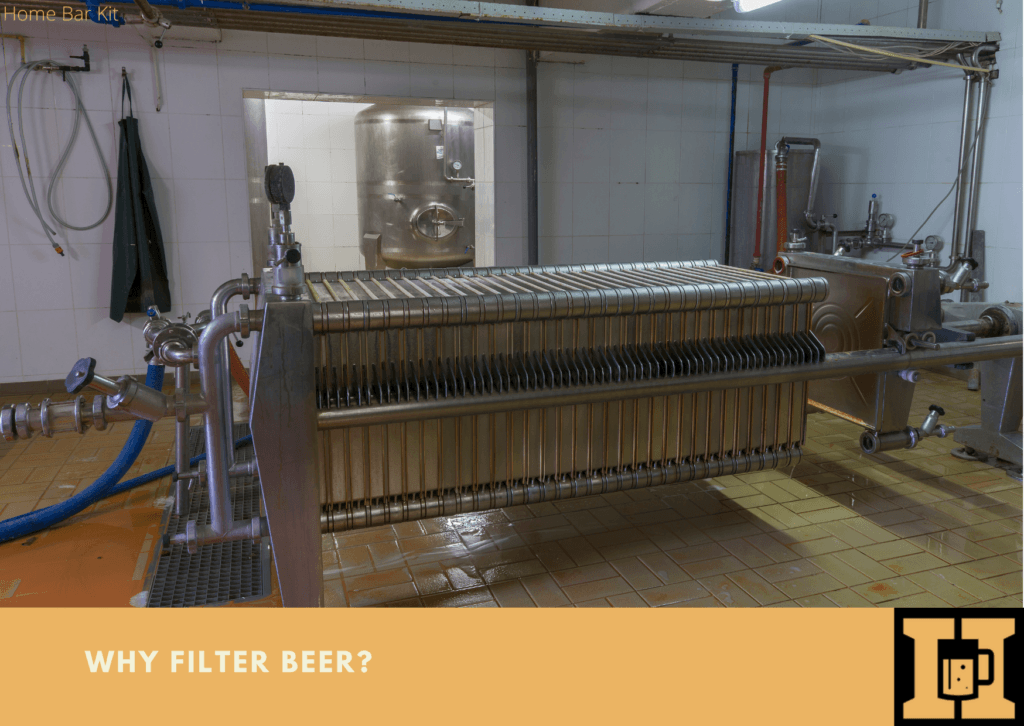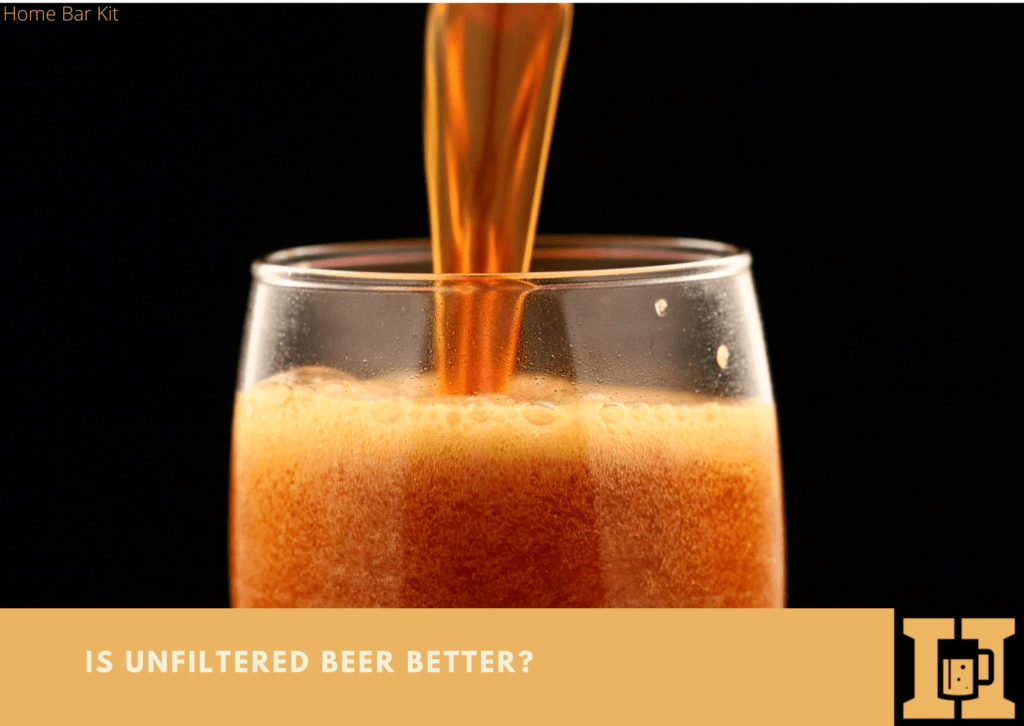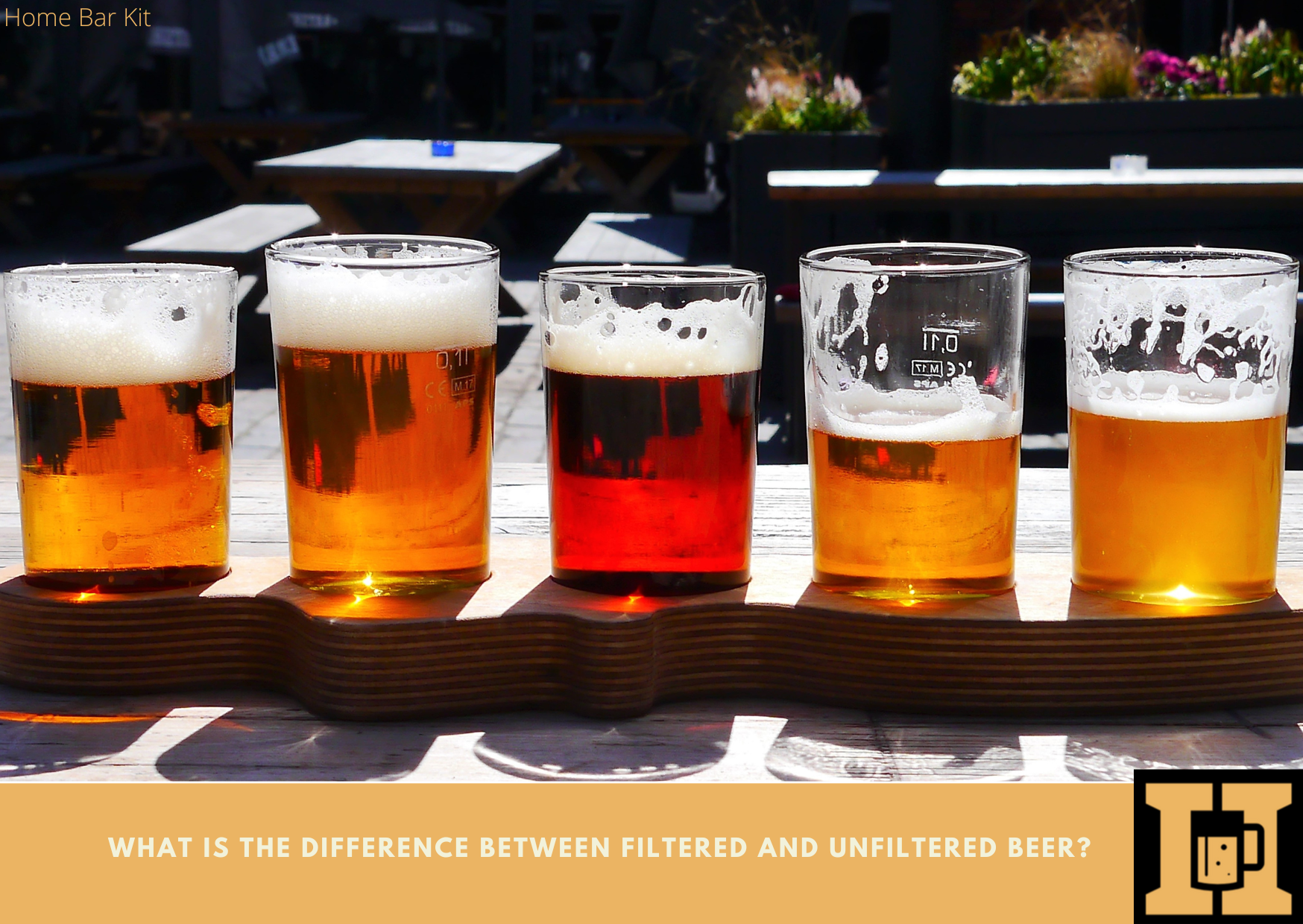Filtered beer is clear in appearance, and an unfiltered beer is murky. A filtered beer is crisp and clean tasting, whereas an unfiltered beer is grainy and bitter. A filtered beer has little aroma, whereas an unfiltered beer is strong on the nose. True or not? What it the difference between filtered and unfiltered beer?
There are of course differences between the styles of beer. Mainly as the question suggests, one has gone through an extra process of being filtered, but what does that mean for the beer?
In short a filtered beer goes through a process (filtering) which removes the sediment from the beer. This renders the beer stable and finished, which can prolong its shelf life. An obvious advantage when shipping and storing beer before it is presented for sale. An unfiltered beer is still active and can continue to mature in its retail vessel such as a bottle. Some say unfiltered beer has more aroma and taste, but a lesser shelf life.
There are a lot of different opinions to filtered beer Vs unfiltered beer.
Why Filter Beer?

The common opinion of why beer was ever filtered in the first place is to clean it up. The expectation of a beer was for it to be crystal clear and free of sediment.
No one wanted a cloudy beer and no one wanted sediment in their beer either.
Filtered beer led to a brighter clearer beer that retained a perfect foam head. It also cleared out fermentation products that could effect the taste of the beer and prolonged the shelf life.
So all that makes sense and clear bright beer without sediment did become the expected product. Also commercially it makes sense for beer to have a longer shelf life.
A beer can go on a long journey from country to country and then sit in a warehouse until its final destination, the customers hand.
So why then is there a trend for beers to be unfiltered?
Is Unfiltered Beer better?

An unfiltered beer may be hazy and can contain sediment. This was seen as unfinished or dirty beer, however that is not true, it just hasn’t been filtered.
This points to a beer being better if it is filtered. However many breweries, especially craft breweries are making unfiltered beers.
Some say that filtering can strip out some of the color, aromas and flavors of the beer.
An unfiltered beer will give a deeper color and have a hazy appearance, more aromas and more flavors, which is obviously a good thing.
Not everyone agrees with this though, and opinions differ considerably.
Maybe some smaller breweries don’t filter their beer because of the cost. Extra equipment and time is needed to put beer through a filtration process.
Health Benefits Of Unfiltered Beers
There even those that say an unfiltered beer has certain health benefits over a filtered beer. I know, I couldn’t believe that one either. Obviously this is as long as it is consumed in moderation.
Apparently unfiltered beer is rich in antioxidants and can help fight against bad cholesterol. There is even a mention of help against the big C, which is some bold claim.
B vitamins and folic acid which help with body cells. A high fiber content aids digestion and unfiltered beer is mineral rich which helps with many things in the body.
I have found no scientific proof of this, so am not saying any of this is true. But I have found many websites that explain these health benefits of unfiltered beer. I am not saying their information is false either, but I am sceptical.
Which Is Better Filtered Or Unfiltered Beer?

So which is better? Filtered beer gives us a clean crisp product, but could be stripped of some of its qualities. Unfiltered beer on the other hand may be hazy and contain sediments, but keeps the qualities of aroma and flavors.
I believe there is some truth to these two differences. If I drink a mass produced beer that is filtered, there isn’t always much of a nose to it. The same goes for flavor, a lot of them do lack flavor.
The opposite is true for a lot of beers I have tried that are unfiltered. Some of them are really lively on the nose and bursting with flavor.
There is another dimension to filtered or unfiltered beer. In between the two can be varying levels of filtration. Depending on what type of filtration method is used will determine how close the beer is to unfiltered or sterile filtered.
However that is a story for another day, the article I linked to earlier (health benefits) explains the different filtration methods.
I see both sides of the coin, there are good reasons for filtering beer. Just as there are good reasons for not filtering beer. For me it is about personal choice, and to be honest I enjoy both filtered and unfiltered beers.
Final Thoughts
There are definite differences between filtered and unfiltered beer. Whether it be for commercial reasons and shelf life, or for maximum aroma and flavor.
Filtered beer has dominated for many years, but now with a trend for unfiltered beers we have a choice. Everyone will get something different from each type, so it does really come down to personal choice.
I don’t think it can be said that one is better than the other or that one produces a more superior beer to the other. It depends what characteristics an individual wants in a beer.
It will be interesting to know what you think of the filtered vs unfiltered beer. Why not drop your opinion below and share your thoughts on the subject.
It must be beer o’clock, now what shall I have filtered or unfiltered?
Rob is a passionate home bar and pub shed enthusiast with a passion for craft beer. With hands-on experience in designing and building his own home bar, Rob shares his knowledge, tips, and inspiration to help fellow enthusiasts create their own perfect space. Alongside the world of home bars and pub sheds, Rob also explores the diverse and exciting realm of craft beer, providing honest reviews to help you discover your next favorite brew. Join Rob on a journey of flavor, design, and craftsmanship right here on Home Bar Kit.


I can drink filtered or unfiltered as long as the flavour is there, I’m also someone who is interested in beer & drinks different types depending what i fancy, never understand people who go into a pub & just havd a pint of the usual! Also i believe with the popularity of the NEIPA products are added to make it more cloudy which I don’t agree with .
Hi Andy,
I am the same, whether it is filtered or unfiltered it doesn’t matter just as long as it is a good beer. I guess some people just like what they like and prefer to stick to the same drink. We are all different, but again like you I prefer to try new beers as I come across them.
Cheers
Rob
Hi Rob,
I am a manager at an independent British brewery and a regular reader of your features. You recently reviewed one of our beers in fact!
Filtration is one of those tricky topics that often gets framed as a debate between “craft” and “commercial”. In truth, many craft breweries would probably utilise a filtration system if they had the capital expenditure or site space available to them, and many traditional or commercial breweries have fantastic pilot plants that output hazy beers of many varieties to their local markets and web shops.
Most of the products of the raw materials that constitute beer pass unimpeded through a filter – the essential oils and alpha acids of the hops, the esters and phenols of the yeast, the sugars and colour compounds of the malt are all too small to be picked up by the kinds of filter mediums used in brewing. There are a multitude of fantastically hoppy beers available that have been filtered.
That said, unfiltered beers that age gracefully are a testament to their creators, and careful selection of yeast and hop varieties is paramount in these products, as they contain a much greater quantity of suspended yeast cells and plant material from raw hops. Believe me when I tell you that for many breweries in-house yeast cultures, you’d be glad that the majority of the cells have been removed!
As for health benefits, I’ll always err on the side of caution- the benefits of a few antioxidants (a wonderfully pseudoscientific term at the best of times) are vastly outweighed by the impact of consuming an elevated level of ethanol and 120 kcal per 100ml. Most breweries would shy away from trying to tout the health benefits of a product that is known to be addictive and should always be enjoyed in moderation.
As a last note, it’s worth bearing in mind that the humble British cask (in my opinion, the finest selection of beer available anywhere in the world) should always pour brilliantly bright, and is rarely, if ever, filtered, and instead relies on the centuries old practice of fining and sedimentation to create that crystal clear finish. Clean and drinkable beer is certainly not a goal only achievable through filtering!
If you would ever like any more insights into the brewing industry and these sorts of topics, feel free to get in touch.
B
Hi B,
Firstly I would like to thank you for taking the time to explain some great points about filtered and unfiltered beer. Your information adds value to this post and is much appreciated.
Second, of course I am now wondering what brewery you manage and what beer I reviewed. I hope the review was well received by yourself and your brewery.
I won’t lie it is a nice feeling to think that a manager of a brewery visits my website and reads my posts. The offer for more insights into the brewing industry is very kind and I will be in touch.
Cheers
Rob